 Petzlover
Petzlover Bracco Italiano is originated from Italy but Grand Gascon Saintongeois is originated from France. Bracco Italiano may grow 6 cm / 2 inches shorter than Grand Gascon Saintongeois. Both Bracco Italiano and Grand Gascon Saintongeois are having almost same weight. Both Bracco Italiano and Grand Gascon Saintongeois has same life span. Both Bracco Italiano and Grand Gascon Saintongeois has almost same litter size. Both Bracco Italiano and Grand Gascon Saintongeois requires Low Maintenance.
Bracco Italiano is originated from Italy but Grand Gascon Saintongeois is originated from France. Bracco Italiano may grow 6 cm / 2 inches shorter than Grand Gascon Saintongeois. Both Bracco Italiano and Grand Gascon Saintongeois are having almost same weight. Both Bracco Italiano and Grand Gascon Saintongeois has same life span. Both Bracco Italiano and Grand Gascon Saintongeois has almost same litter size. Both Bracco Italiano and Grand Gascon Saintongeois requires Low Maintenance.
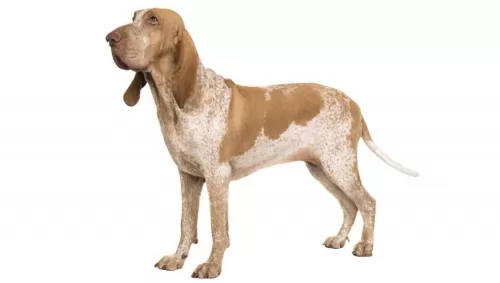 The attractive and popular breed in Italy, the Bracco Italiano was used for tracking and retrieving, evolving in Piedmont and Lombardy. It is believed the Bracco Italiano came about from crossing the Segugio with the ancient Asiatic Mastiff.
The attractive and popular breed in Italy, the Bracco Italiano was used for tracking and retrieving, evolving in Piedmont and Lombardy. It is believed the Bracco Italiano came about from crossing the Segugio with the ancient Asiatic Mastiff.
There are people however, who believe that the breed goes back to the St Hubert Hound, but it is certain that both hounds and gundogs are part of the breed’s ancestry. The dog only arrived in Britain in the last decade of the 20th century.
 Known also as the Virelade, the Grand Gascon Saintongeois hails from the Saintongeois region of France, being a newish addition to the hunting dog breed.
Known also as the Virelade, the Grand Gascon Saintongeois hails from the Saintongeois region of France, being a newish addition to the hunting dog breed.
The Saintongeois hound and the Grand Blue de Gascogne are the ancestors of this scentdog as these two breeds themselves, are exceptional hunters. The Grand Gascon Saintongeois is a large dog and favored by the French nobility for its ability to hunt.
After the French Revolution the popularity of the breed waned. It was Baron Joseph de Carayon-LaTour who tried to revive the Saintongeois Hound. The dogs were mated with the Grand Bleu de Gascogne and were so outstanding that breeding was continued. The breed that was created is the Grand Gascon Saintongeois which we know today.
It was in January 1993 that the Grand Gascon Saintongeois was officially recognized by the United Kennel Club.
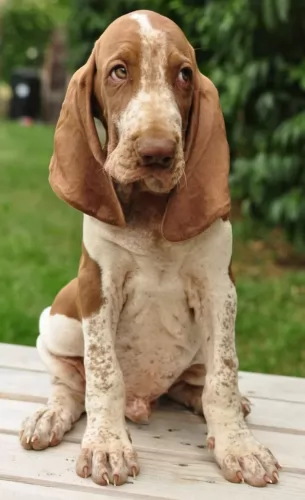 The Bracco Italiano is a large athletic, muscular dog. He stands at 58–67cm, weighing anything between 25 – 40kg. He reminds one somewhat of a German Short-haired Pointer. He has long ears and a serious expression, and this reminds one of a Bloodhound. He has short, shiny hair with his coat being white and chestnut or orange. The tail of the Bracco Italiano has always been docked, giving him an attractive, distinctive look but with rules and regulations coming in regarding docking, the long tail is often left intact. His eyes are brown.
The Bracco Italiano is a large athletic, muscular dog. He stands at 58–67cm, weighing anything between 25 – 40kg. He reminds one somewhat of a German Short-haired Pointer. He has long ears and a serious expression, and this reminds one of a Bloodhound. He has short, shiny hair with his coat being white and chestnut or orange. The tail of the Bracco Italiano has always been docked, giving him an attractive, distinctive look but with rules and regulations coming in regarding docking, the long tail is often left intact. His eyes are brown.
Braccos are wonderful pets – they are intelligent, loving, gentle and amicable, getting on well with children in the home as well as with other pets. Socialize and train them and they become gentle and obedient. They long to be involved with their human family and will adapt to life in the city or the country so long as they are made to feel like family. He is alert and makes a good watchdog. As with most other dogs, they can’t be bought, loved as a puppy and then ignored and left to themselves when they grow into adults.
 The Grand Gascon Saintongeois is a large, well built breed of dog that looks strong and robust. His head is strong and covered with loose skin that forms wrinkles around the cheeks. He stands at 61-73cm and weighs 30 to 35kg.
The Grand Gascon Saintongeois is a large, well built breed of dog that looks strong and robust. His head is strong and covered with loose skin that forms wrinkles around the cheeks. He stands at 61-73cm and weighs 30 to 35kg.
He has straight, long legs. He has a short, smooth coat which is white with black patches. Sometimes you'll also find a speckled or ticked pattern. There'll be tan dots over the eyes.
The eyes are brown, the nose black and the long, thin textured ears are low on the dogs head and also well back on the skull. The tail is long.
He is known for his deep voice to voice an opinion. He is a loving, friendly, courageous and affectionate breed with a well balanced temperament, making him a splendid pet. He is also intelligent and so he won't battle at all to learn some rules. Training and socialization will be good for him even though he is such an amicable dog already, but then he just becomes extra obedient.
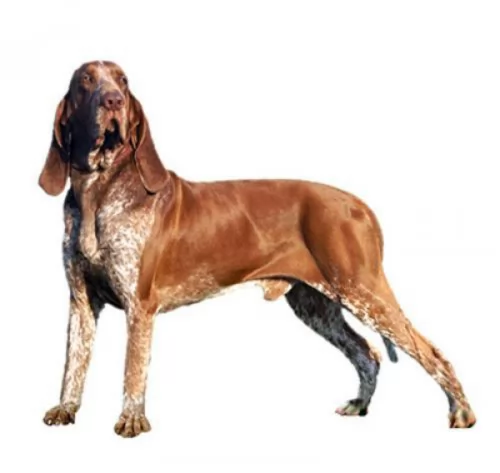 The gentle, amicable Bracco Italiano is a versatile dog that can be a super sport companion for active people and it can also be an exceptional companion for families and older people. He has a sweet, gentle expression and his amicable nature makes him easy to love. He is alert though, and therefore can be both protector and friend at the same time.
The gentle, amicable Bracco Italiano is a versatile dog that can be a super sport companion for active people and it can also be an exceptional companion for families and older people. He has a sweet, gentle expression and his amicable nature makes him easy to love. He is alert though, and therefore can be both protector and friend at the same time.
Overall, this easy going dog with his low maintenance coat can make an excellent 4-legged addition to any family.
 Your Grand Gascon Saintongeois is a true hunting dog breed and valued for his hunting prowess. He has another side to him though and is gentle, loving and calm with his human family.
Your Grand Gascon Saintongeois is a true hunting dog breed and valued for his hunting prowess. He has another side to him though and is gentle, loving and calm with his human family.
He makes a wonderful family companion, getting on well with children as well as pets in the home. He may show a bit of aggression to strangers and this is why training and socialization works so well with him as it helps him behave well around family and strangers.
Training is never a problem as he is an intelligent dog. He is an energetic dog and won't fit well into city life in tiny properties, also because of his tendency to bark when bored. He fits well into country life or large properties.
When you provide your large pet with good food, a warm place to sleep, exercise and plenty of love and attention, the Grand Gascon Saintongeois is going to turn out to be one of the most loyal, affectionate pets you can imagine.
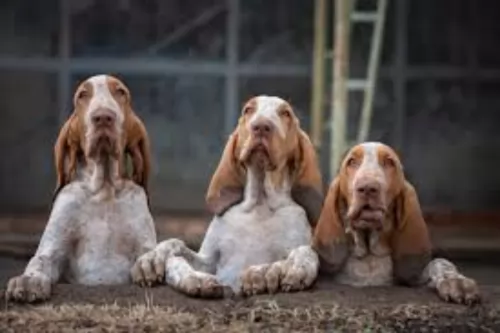 There don’t appear to be any major health issues with your Bracco Italiano and he can live to be 12, 13 or 14 years of age. Because he is a large breed however, you will need to watch out for hip dysplasia.
There don’t appear to be any major health issues with your Bracco Italiano and he can live to be 12, 13 or 14 years of age. Because he is a large breed however, you will need to watch out for hip dysplasia.
Hip dysplasia is a common skeletal disease with dogs and larger dogs have the genetic predisposition for hip dysplasia. Your dog can develop joint inflammation with pain and lameness.
Other health problems to look out for include kidney disease (Amaloidosis), cherry eye which results in dry eye. If you want to buy a Bracco Italiano, you should ask the breeder about the medical history of the parents.
 Your Grand Gascon Saintongeois is a robust dog, who with good care can reach up to 14 years of age. You're not going to be running to the vet often with this strong looking dog, but even so, there are one to two problems that you'll want to look out for.
Your Grand Gascon Saintongeois is a robust dog, who with good care can reach up to 14 years of age. You're not going to be running to the vet often with this strong looking dog, but even so, there are one to two problems that you'll want to look out for.
Long-eared dogs are more susceptible to canine ear infections. The symptoms of the infection will be dependent on how severe it is. Certainly your dog may experience pain and you'll see him shaking his head and pawing at his ear. If both ears are affected by inflammation, he may even walk in a wobbly fashion and the infection could lead to deafness. It is imperative that he get to the vet as soon as possible.
This is where the ball and socket joint of the hip is malformed. It results in a joint rubbing and grinding. It can lead to loss of function of the hip joints. It is a common skeletal disease in young or old dogs, small or large dogs and in both males and females.
Large dogs are more commonly affected though with hip dysplasia which can see arthritis developing too. Your dog will display decreased activity and difficulty with standing up after lying down. Veterinary intervention will be required.
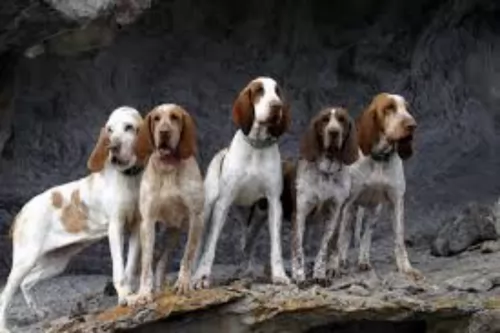 These dogs are moderate shedders so he will simply need a good brushing twice a week to ensure the coat is kept shiny and free from loose hairs. Nails should be clipped from time to time and he will also need to have his long ears checked for cleanliness. Long-eared dog breeds are more susceptible to canine ear infections.
These dogs are moderate shedders so he will simply need a good brushing twice a week to ensure the coat is kept shiny and free from loose hairs. Nails should be clipped from time to time and he will also need to have his long ears checked for cleanliness. Long-eared dog breeds are more susceptible to canine ear infections.
The Bracco is a large dog and therefore he will require a high quality, large-breed dog food formula. Your veterinarian can even recommend a quality commercially manufactured food for large, energetic dogs and which comes with all the vitamins and minerals required for such a breed.
Your vet will recommend you steer clear of foods with cheap fillers, lots of preservatives, sugar and colorants. He has a glossy, dense short coat and you want to ensure he gets raw meat, rice and vegetables from time to time to ensure that the beautiful coat never becomes dull and dry.
Cool, fresh water must always be available to him. Diet and nutrition is an important decision for your pet as it will ultimately affect his long term health.
 These large dogs with their short smooth coats have very little grooming needs. Regular brushing twice a week will remove dead hair and also ensure the good condition of the coat.
These large dogs with their short smooth coats have very little grooming needs. Regular brushing twice a week will remove dead hair and also ensure the good condition of the coat.
He has long ears and these will need to be checked regularly to avoid ear infections. It will be a good idea to learn how to clean the ears and to do it in such a way as to avoid damaging them. Signs of ear infection include redness, discharge, irritation and bad odor.
Following the feeding instructions on the packaging of top quality kibble, provide your Grand Gascon Saintongeois with at least 2 meals a day. To steer away from the monotony of kibble every day, mix in some raw meat from time to time, and also include some cooked brown rice, chicken and vegetables as a tasty treat. Fresh, cool water should always be easily accessible to him.